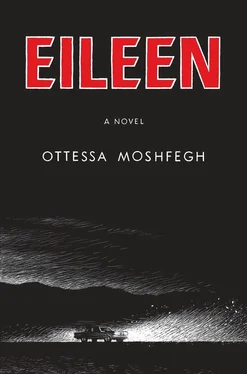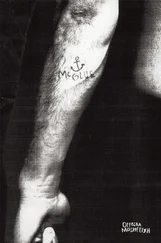That afternoon I watched as the boys filed into the chapel and sat in the first few rows of seats, slumped and irritable. Randy stood at the foot of the stage, facing them. To fulfill my duties, I sat on the high stool in back and plugged in the old spotlight that swiveled around in a cast-iron frame attached to the rear wall. I steered it so it illuminated the stage, shining a bright circle onto the wrinkled orange curtains. It reminds me now of the opening credits of Bugs Bunny cartoons. That tune plays in my head from time to time as a way of making light of deranged situations. I remember the scenes of that Christmas performance in vivid Technicolor. It was just absurd.
A moment before the lights went down, Rebecca appeared in the doorway carrying a small notebook with a pen stuck through the wire spiral spine. The guards’ eyes and mine followed her small, childlike bottom down the aisle. She took a seat off to the side near the front, next to Dr. Morris, where Randy was standing guard. This made me edgy. I would have preferred that the two of them, Rebecca and Randy, never cross paths. Rebecca was too pretty for Randy not to notice her, and despite our new bond, I was still full of envy. It didn’t matter at all that I’d been fantasizing my great escape, never again to return to X-ville and certainly not to Moorehead, Randy soon to become what he is now, an expired dream, a ghost, a shadow. “Good-bye, Randy, good-bye,” I imagined sobbing on my train to New York.
I remember that a row of boys, each wearing a blue or gray knit vest, erupted in a flurry of curse words and tossed fists as the lights went down. Randy broke from his statuelike posture to dissolve the fight. It was wonderful to watch him at work. He moved so efficiently, so coolly, without judgment, but with swift force. I could barely breathe watching how his muscles strained against the stiff give of his uniform. I suppose I really was in love with him in the worst sense: I cared only for his looks, his body — I barely knew him at all.
When the boys were all back in their seats, the warden walked out onstage. I steered the spotlight up to his face, but let it rest first — accidentally or not — for a moment at his crotch. A few boys laughed. The warden took the microphone and said something like this:
“Merry Christmas, prisoners, staff, and visitors. Every year we hold a special assembly to commemorate this most important of holidays, and every year we remark on just how much of the story of Christmas can be gleaned to uphold our principles, which is a great deal, and we pray to see if and where we are failing and just how the story of a child, not so unlike many of you boys born also to young parents without much money, little hope, could show us the errors of our ways and inspire us to change, be good, and live a life clear of outbursts, dereliction and destruction. So I hope you will all sit back and watch with open minds, questioning in your hearts where you can be improved, and what the teachings of our holy scripture say for us to be. Our dear friends at Mount Olive have helped to direct this year’s performance of the Nativity and I want every single boy to now sit on his hands and zip his lips. If I hear one laugh or moan or any wayward comment, it’s straight to the cave. And don’t test me on that. We also welcome two additions to our prison staff, Dr. Morris, our new sanity professional, as I like to think of you — welcome, welcome. And Miss Saint John, our education expert. She may be easy on the eyes, fellows, but I assure you, she’s very clever and will have more to make of your sick minds than I could ever hope to. You will all meet with her in due time. If that is not incentive enough to keep you quiet this afternoon, I don’t know what is. And now, without further ado.”
It disgusts me now to think how I had an odd sort of crush on the warden. Perhaps I envied his self-possession, I don’t know. He did always seem very pleased with himself. Although it barely masked his stupidity, there was a sureness about him I guess I found attractive. I was so easily swayed by the vestiges of power. I remember the warden untangling himself from the microphone cord, then extending his hand to an elderly priest in a wheelchair. In hindsight, the warden was probably a homosexual. He made a point of spanking the younger boys alone in his office, I heard. But that is a whole other story and not mine to tell.
When the orange curtains parted, a spartan set was revealed, made up to look like the interior of a prison cell. A bunk bed, a Bible on a small table. One of the boys, bloated and pale and dressed in the standard inmate uniform, a blue cotton jumpsuit, walked out onto the stage, hands in his pockets. He mumbled under his breath, but I can guess what he was meant to say since it was the same every year: “Oh, what am I to do? Sentenced for three years to sit indoors among boys of my same creed — plain bad. So much time to plot what evildoings I’ll undertake as soon as I get out. But in the meantime I suppose I could read a book.”
“You can’t read!” a voice cracked from the first row as the blushing actor picked up the Bible. The boys all laughed and throttled each other in their seats. Randy approached, gestured casually with one hand raised in a fist and the other holding a finger to his lips. The play went on.
The boy onstage sat on the bottom bunk bed and opened the Bible. Two more children crossed the stage toward him, both dressed in robes, one wearing a wig and, it seemed, a pillow over his abdomen under the robe. From where I was sitting, I could see Rebecca shifting in her seat. Of course it bothered me to watch what was happening on stage, that kind of humiliation. But I put up with it. I did not have the courage to care enough to get upset. Nobody did. The boy dressed as Mary spoke in a high voice: “Well, I’m pretty tired, can we rest in that barn over there?” and pointed offstage, fey as a rabbit. The audience laughed. The boy dressed as Joseph set down a sack and wiped his forehead. “Better than paying for a hotel.” Rebecca looked around, craning her neck as though searching for a particular face in the crowd. I hoped the face she was looking for was mine. I could just barely make out her expression in the darkened chapel. I nearly swung the spotlight at her to illuminate her delicately furrowed brow, her mouth pinched adorably with displeasure. She was so pretty, a miraculous sight in such an ugly place, it surprised me that others weren’t pointing and staring. How was it that Dr. Morris, Randy, all those boys carried blithely on, as though she were invisible to them? Was my assessment of her beauty wrong? Had I lost all perspective? Was I seeing things? Was she not the most radiant, most elegant, most charming woman in the world? I wondered. She continued to scan the audience row by row.
The play went on, Joseph and Mary reciting lines sometimes stiffly, sometimes with tongue-in-cheek bravado. More children in multicolored robes appeared, heads bowed in embarrassment or boredom. Their voices were barely audible through the taunts and laughter from the boys in the crowd. One of the players, a younger child, began to cry, chin wobbling, jaw gritted. That was when Rebecca stood up, scowling, and trudged back up the aisle, her pendant bouncing between her small bosoms as she strode. I watched her. Her body was very beautiful, slender as a ballerina and just as tense. She noticed me when she reached the back of the chapel, then waved and shook her head in disbelief, mouthed something I couldn’t decipher, and walked out. I remember thinking, “We are united now, us against them.” I would adopt her rage, or pretend to at least, if it meant I could be on her side. That’s what it felt like.
• • •
I t wasn’t that I didn’t care at all about the boys. It was just that I was young and miserable and had no way of helping them. I felt, in fact, that I was one of them. I was no worse or better. I was only six years older than the oldest of the boys in there. Some of them looked like men already — tall, lanky with beards and mustaches coming in and big, thick hands, low voices. They were mostly white from blue-collar families, but there were quite a few black boys, too. I liked those boys the best. I sensed they understood something the others didn’t. They seemed to be more relaxed, to breathe slightly more deeply, to wear perfect death masks while the other boys winced and frowned and spat and chided one another like little children, brats in a schoolyard. I often wondered what they all thought of me when they saw me standing outside the door during visitations, if they even noticed me at all. They rarely looked my way, never once lifted their grainy, warm slow eyes to mine in recognition. I thought perhaps they couldn’t identify me from one day to the next, as though my role were played by innumerable similar-looking young women. Or maybe they sat with their mothers during visitation and called me “that bitch,” and motioned with their chins when my head was turned and I was thinking of Randy and not listening. Or maybe they said, “She’s the only one I don’t hate.” Or maybe they thought I was crazy. I certainly could have passed for crazy on days when I’d not slept and showed up unkempt and hungover, rolling my eyes at every noise and gnashing my teeth at every flicker of light. In my childish self-centeredness, I fantasized that this was what the black boys talked about with their mothers: how much pain Eileen is in, how Eileen seems to need a friend, how Eileen deserves better. I hoped they saw right through my death mask to my sad and fiery soul, though I doubt they saw me at all.
Читать дальше












